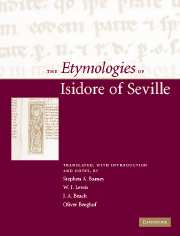Book contents
- Frontmatter
- Contents
- Acknowledgements
- Note to the Reader
- INTRODUCTION
- THE ETYMOLOGIES
- Analytical table of contents
- Book I Grammar (De grammatica)
- Book II Rhetoric and dialectic (De rhetorica et dialectica)
- Book III Mathematics (De mathematica)
- Book IV Medicine (De medicina)
- Book V Laws and times (De legibus et temporibus)
- Book VI Books and ecclesiastical offices (De libris et officiis ecclesiasticis)
- Book VII God, angels, and saints (De deo, angelis et sanctis)
- Book VIII The church and sects (De ecclesia et sectis)
- Book IX Languages, nations, reigns, the military, citizens, family relationships (De linguis, gentibus, regnis, militia, civibus, affinitatibus)
- Book X Vocabulary (De vocabulis)
- Book XI The human being and portents (De homine et portentis)
- Book XII Animals (De animalibus)
- Book XIII The cosmos and its parts (De mundo et partibus)
- Book XIV The earth and its parts (De terra et partibus)
- Book XV Buildings and fields (De aedificiis et agris)
- Book XVI Stones and metals (De lapidibus et metallis)
- Book XVII Rural matters (De rebus rusticis)
- Book XVIII War and games (De bello et ludis)
- Book XIX Ships, buildings, and clothing (De navibus aedificiis et vestibus)
- Book XX (Provisions and various implements)
- APPENDIX Correspondence of Isidore and Braulio
- INDEX
Book V - Laws and times (De legibus et temporibus)
Published online by Cambridge University Press: 22 September 2009
- Frontmatter
- Contents
- Acknowledgements
- Note to the Reader
- INTRODUCTION
- THE ETYMOLOGIES
- Analytical table of contents
- Book I Grammar (De grammatica)
- Book II Rhetoric and dialectic (De rhetorica et dialectica)
- Book III Mathematics (De mathematica)
- Book IV Medicine (De medicina)
- Book V Laws and times (De legibus et temporibus)
- Book VI Books and ecclesiastical offices (De libris et officiis ecclesiasticis)
- Book VII God, angels, and saints (De deo, angelis et sanctis)
- Book VIII The church and sects (De ecclesia et sectis)
- Book IX Languages, nations, reigns, the military, citizens, family relationships (De linguis, gentibus, regnis, militia, civibus, affinitatibus)
- Book X Vocabulary (De vocabulis)
- Book XI The human being and portents (De homine et portentis)
- Book XII Animals (De animalibus)
- Book XIII The cosmos and its parts (De mundo et partibus)
- Book XIV The earth and its parts (De terra et partibus)
- Book XV Buildings and fields (De aedificiis et agris)
- Book XVI Stones and metals (De lapidibus et metallis)
- Book XVII Rural matters (De rebus rusticis)
- Book XVIII War and games (De bello et ludis)
- Book XIX Ships, buildings, and clothing (De navibus aedificiis et vestibus)
- Book XX (Provisions and various implements)
- APPENDIX Correspondence of Isidore and Braulio
- INDEX
Summary
i. The originators of laws (De auctoribus legum) 1. Moses of the Hebrew people was the first of all to explain the divine laws, in the Sacred Scriptures. King Phoroneus was the first to establish laws and legal processes for the Greeks. 2. Mercury (i.e. Hermes) Trimegistus first gave laws to the Egyptians. Solon was first to give laws to the Athenians. Lycurgus first devised legal structures for the Spartans by the authority of Apollo. 3. Numa Pompilius, who succeeded Romulus to the throne, first established laws for the Romans. Then, when the population was no longer able to bear the factious magistrates, they brought the Decemvirs (lit. the “ten men”) into being to write laws; these men set forth in the Twelve Tables the laws which had been translated from the books of Solon into the Latin language. 4. These men were: Appius Claudius, Genucius, Veterius, Julius, Manlius, Sulpicius, Sextius, Curatius, Romilius, and Postumius. These Decemvirs were selected to draw up laws. 5. The consul Pompey first wanted to undertake the collection of the laws into books, but he did not continue for fear of detractors. Then Caesar began to do this, but he was killed first. 6. And gradually the ancient laws became obsolete due to age and neglect; although none of them is still in use, nevertheless a knowledge of them seems needful. 7. New laws originated from Emperor Constantine and the others following him, but they were mixed and disordered.
- Type
- Chapter
- Information
- The Etymologies of Isidore of Seville , pp. 117 - 134Publisher: Cambridge University PressPrint publication year: 2006

